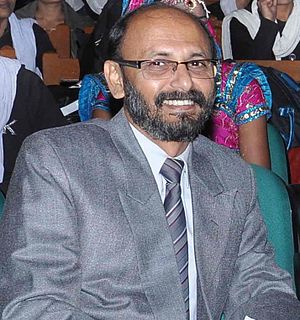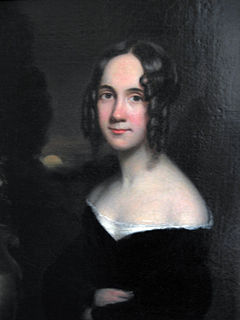A Quote by Sarah Fielding
There appears to be but two grand master passions or movers in the human mind, namely, love and pride. And what constitutes the beauty or deformity of a man's character is the choice he makes under which banner he determines to enlist himself. But there is a strong distinction between different degress in the same thing and a mixture of two contraries.
Related Quotes
Philosophers have long conceded, however, that every man has two educators: 'that which is given to him, and the other that which he gives himself. Of the two kinds the latter is by far the more desirable. Indeed all that is most worthy in man he must work out and conquer for himself. It is that which constitutes our real and best nourishment. What we are merely taught seldom nourishes the mind like that which we teach ourselves.
We human beings don't realize how great God is. He has given us an extraordinary brain and a sensitive loving heart. He has blessed us with two lips to talk and express our feelings, two eyes which see a world of colors and beauty, two feet which walk on the road of life, two hands to work for us, a nose which smells the beauty of fragrance, and two ears to hear the words of love.
There are for man only two principles available for a mental grasp of reality, namely, those of teleology and causality. What cannot be brought under either of these categories is absolutely hidden to the human mind. An event not open to an interpretation by one of these two principles is for man inconceivable and mysterious. Change can be conceived as the outcome either of the operation of mechanistic causality or of purposeful behavior; for the human mind there is no third way available.
There is only one law of Nature-the second law of thermodynamics-which recognises a distinction between past and future more profound than the difference of plus and minus. It stands aloof from all the rest. ... It opens up a new province of knowledge, namely, the study of organisation; and it is in connection with organisation that a direction of time-flow and a distinction between doing and undoing appears for the first time.
I love you. As the same value, as the same expression, with the same pride and the same meaning as I love my work, my mills, my Metal, my hours at a desk, at a furnace, in a laboratory, in an ore mine, as I love my ability to work, as I love the act of sight and knowledge, as I love the action of my mind when it solves a chemical equation or grasps a sunrise, as I love the things I've made and the things I've felt, as *my* product, as *my* choice, as a shape of my world, as my best mirror, as the wife I've never had, as that which makes all the rest of it possible: as my power to live.
If the denial of death is self-hatred, as it is to deny our freedom and live in fear of death (which is to say, to live in a form of bondage), then the acceptance and affirmation of death is indeed a form of self-love. But I'd want to make a distinction between a form of self-love which is essential to what it means to be human, and a narcissism of self-regard, like Rousseau's distinction between amour de soi and amour propre, self-love and pride.
It by no means follows, that because two men utter the same words, they have precisely the same idea which they mean to express: language is inadequate to the variety of ideas which are conceived by different minds, and which, could they be expressed, would produce a new variety of characteristic differences between man and man.
If you read 1 John you'll see that love of God and neighbour are very closely tied together. Partly this is because all humans are made in God's image, so that when you love another human you are loving someone who is reflecting God himself. Of course there is a distinction but the minute you try to drive a wedge between the two things start to fall apart.
The only distinction between freedom and slavery consists in this: In the former state a man is governed by the laws to which he has given his consent, either in person or by his representative; in the latter, he is governed by the will of another. In the one case, his life and property are his own; in the other, they depend upon the pleasure of his master. It is easy to discern which of these two states is preferable.
For years I have told my students that I been trying to train executives rather than clerks. The distinction between the two is parallel to the distinction previously made between understanding and knowledge. It is a mighty low executive who cannot hire several people with command of more knowledge than he has himself.







































